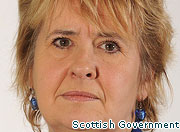Confusion continues to reign over the Scottish government’s plans to crackdown on sectarianism after one of its own ministers gave a “shambolic” explanation of the bill to MSPs.
The Offensive Behaviour at Football and Threatening Communications Bill was drafted to crackdown on sectarianism.
But Roseanna Cunningham MSP stunned MSPs earlier this week when she said that the bill would “not make being offensive at a football match criminal”.
Disorder
James Kelly, Labour’s justice spokesman, branded Mrs Cunningham’s appearance before Holyrood’s Justice committee as “shambolic”.
He added: “Despite the proposed new law being called the Offensive Behaviour at Football Bill, the minister told us today that the Bill wouldn’t make offensive behaviour at a football match a crime. The mind boggles.
“Fans need to know where they stand and exactly what is and isn’t acceptable behaviour. Unfortunately after today’s evidence session we are left no further forward.”
Questions
Christian groups say the bill goes beyond sectarianism at football, and could damage free speech and religious liberty.
John Lamont, the Conservative’s justice spokesman, accused the SNP government of being “all over the place”.
He continued: “They have had all summer to bring forward watertight guidelines which would make sense to football fans, yet many questions have still not been answered.”
Opposed
Mark Dingwall, of the Rangers Supporters Trust, said: “Every offence that it could cover is already covered in Scots law.
“Submissions by churches, civil rights groups and supporters organisations almost to a man are opposed to the terms of the Bill.”
Paul Brennan, who runs a popular Celtic blog, warned that there “is no clarity at all”.
Unwelcome
And John Scott, a human rights lawyer, said that the justice committee “has heard a wealth of evidence suggesting the legislation is either unnecessary or unwelcome.
“I would say if they want to continue with this legislation because they think this type of behaviour is a problem in Scotland then perhaps they should look at setting up a special committee to look at this over a longer period of time and try and work out a better long-term solution — if that is indeed possible.”

